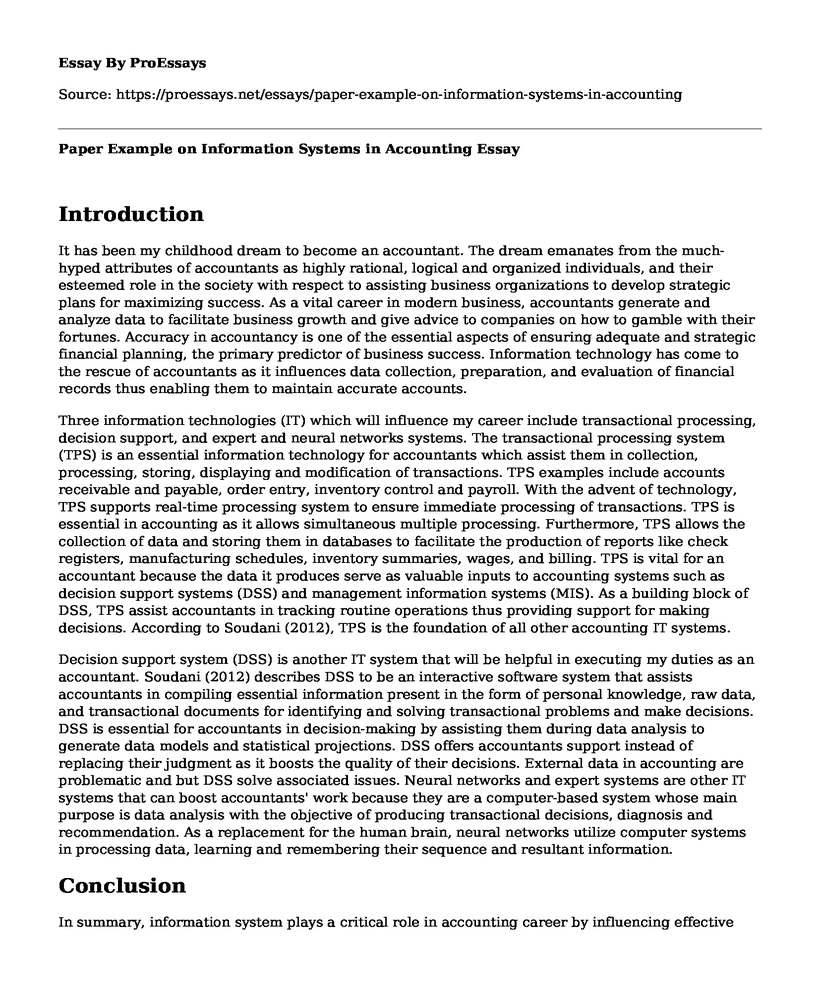Introduction
It has been my childhood dream to become an accountant. The dream emanates from the much-hyped attributes of accountants as highly rational, logical and organized individuals, and their esteemed role in the society with respect to assisting business organizations to develop strategic plans for maximizing success. As a vital career in modern business, accountants generate and analyze data to facilitate business growth and give advice to companies on how to gamble with their fortunes. Accuracy in accountancy is one of the essential aspects of ensuring adequate and strategic financial planning, the primary predictor of business success. Information technology has come to the rescue of accountants as it influences data collection, preparation, and evaluation of financial records thus enabling them to maintain accurate accounts.
Three information technologies (IT) which will influence my career include transactional processing, decision support, and expert and neural networks systems. The transactional processing system (TPS) is an essential information technology for accountants which assist them in collection, processing, storing, displaying and modification of transactions. TPS examples include accounts receivable and payable, order entry, inventory control and payroll. With the advent of technology, TPS supports real-time processing system to ensure immediate processing of transactions. TPS is essential in accounting as it allows simultaneous multiple processing. Furthermore, TPS allows the collection of data and storing them in databases to facilitate the production of reports like check registers, manufacturing schedules, inventory summaries, wages, and billing. TPS is vital for an accountant because the data it produces serve as valuable inputs to accounting systems such as decision support systems (DSS) and management information systems (MIS). As a building block of DSS, TPS assist accountants in tracking routine operations thus providing support for making decisions. According to Soudani (2012), TPS is the foundation of all other accounting IT systems.
Decision support system (DSS) is another IT system that will be helpful in executing my duties as an accountant. Soudani (2012) describes DSS to be an interactive software system that assists accountants in compiling essential information present in the form of personal knowledge, raw data, and transactional documents for identifying and solving transactional problems and make decisions. DSS is essential for accountants in decision-making by assisting them during data analysis to generate data models and statistical projections. DSS offers accountants support instead of replacing their judgment as it boosts the quality of their decisions. External data in accounting are problematic and but DSS solve associated issues. Neural networks and expert systems are other IT systems that can boost accountants' work because they are a computer-based system whose main purpose is data analysis with the objective of producing transactional decisions, diagnosis and recommendation. As a replacement for the human brain, neural networks utilize computer systems in processing data, learning and remembering their sequence and resultant information.
Conclusion
In summary, information system plays a critical role in accounting career by influencing effective collection, processing, and storage of data that concern organization's financial matters and transactional data obtained externally and internally as recorded in organizational documents and transactions. Transactional processing, decision support, and expert and neural networks systems are examples of accounting IT systems that ensure the implementation of controls in ways that guarantee accurate data collection, recording, and processing for informed decision making. These three systems address the six elements of accounting information systems (AIS) namely internal controls, IT infrastructure, software, data, procedure, and people.
References
Soudani, S. N. (2012). The Usefulness of an Accounting Information System for Effective Organizational Performance. International Journal of Economics and Finance, 4(5), 136-142. http://dx.doi.org/10.5539/ijef.v4n5p136.
Cite this page
Paper Example on Information Systems in Accounting. (2022, May 16). Retrieved from https://proessays.net/essays/paper-example-on-information-systems-in-accounting
If you are the original author of this essay and no longer wish to have it published on the ProEssays website, please click below to request its removal:
- Open Source Content Management Systems
- Essay on Use of Audit Logics to Create Assurance on eBay
- Diamond Foods Inc. Paper Example
- Anti-Money Laundering Computer Programs Essay
- Essay Sample on Differences Between Government Accounting and Commercial Accounting
- Research Paper on Programming, Web Source Code and Technology Crisis
- Essay Example on Data Breach at Trexpendition: Risks and Solutions







